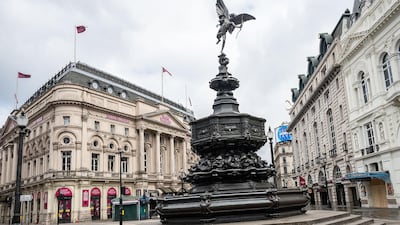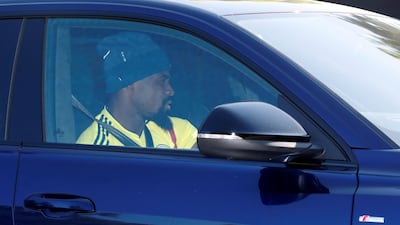The London Theatreland, the British capital's main theatre district, has long thrived on dramas surrounding sudden death. For years, it has been one of the pillars of the UK's soft power. But it is facing a rapid demise, with reports last week suggesting that up to 70 per cent of venues in the city could close.
The same is true of orchestras and museums. And with the Premier League club football competition scheduled to resume only in a couple of weeks' time, many people around the world have felt a huge void.
For decades, soft power has been the magic sauce of international relations. But the coronavirus pandemic has upended how people travel and how they express their interests.
For the UK this poses particular dangers. Last week, the Organisation for Economic Co-operation and Development said that Britain would be particularly hard-hit by the downturn in international travel, tourism and exports of cultural services. What is true for the economy is also valid for the nation's reputation abroad, and London's ability to attract attention – along with its many other intangible connections – contributes to the country's reputational strength.
"Experience industries" around the world are facing the same problem. But perhaps because of its leading role, the issue has opened up a lively debate in Britain that is worth putting in context for a wider audience.
When the British Council formed a soft power alliance a few years ago, it set out its goals as uniting the international reach with domestic impact. “The aim of the group," it said, "is to support a more connected, attractive and trusted UK, and to protect and promote the values, diversity and integrity of UK soft power.”
Some institutions are so dependent on overseas visitors that the state will be compelled to step in. For instance, three quarters of visitors to the British Museum are from overseas. Tristram Hunt of the Victoria and Albert Museum said half its audience are from overseas. Yet, he added that the museum will have to concentrate on attracting locals for the immediate future.
Polls show that four out of five visitors to London come to the city for the cultural offer. It is therefore not clear whether locals and digital patrons can make up for the low numbers of outsiders. But Mr Hunt and his colleagues will have little option.
Last week, the Royal United Services Institute (Rusi), a UK think tank that concentrates on military and security matters, issued a note on the implications of all this. It pointed to international measures being taken in the realm of reputational diplomacy and said these were due for a shake-up. “The soft power landscape will not look the same by the end of 2020,” it said.
The paper suggested that China’s recent trajectory held lessons for others.
The country was the origin of the outbreak and yet, has not emerged as the worst hit in terms of the health impact. It has used its industrial base to supply personal protection equipment to many nations, including the UAE and the UK. When the hard-hit Italian response to Covid-19 received shipments that were not coming from other parts of Europe, Rusi pointed out that China was praised as a benefactor.
How much impact the immediate events of the pandemic will have over the long run remains to be seen.
It is certainly true that people will make new judgements about what they value and what is no longer in fashion. The institutions themselves will have to reformulate their offer with a much greater digital component.
Sports franchises may not endure. And so the pull factors implicit in soft power are changing, for the moment fairly imperceptibly, with every day.
Oliver Dowden, the UK's minister for culture, spoke last week of his determination not to see a prime "British asset" sunk by the recession triggered by the pandemic shutdown. There are no details but with the government spending tens of billions of pounds to pay wages and prop up unemployment, it seems certain that a rescue package is on the way. The creative industries – ranging from the football pitch to the mirrored stage – are something that the country cannot afford to lose, as it looks to build on its "Global Britain" policy.
The cost will not come cheaply but the tide of ideas is turning. Even veteran free-market economists are issuing reports saying the government must act as customer and investor.
It seems reasonable to include culture in a new philosophy of the role of government. The pandemic has highlighted the importance of health care and social resilience. States pursuing enlightened policies in these fields will surely be champions of the coming new soft-power order.

Technology, artificial intelligence and digital identities will also be added to existing pillars. The strength of creatives will never be more important.
I venture to suggest that there will always be a staging of The Mousetrap in London's West End district, even if the real-time audience is likely to be scattered across the globe and not just on the plush theatre seats.
Damien McElroy is the London bureau chief of The National




























